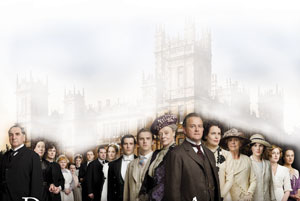 |
In an age where TV is ubiquitous and the majority of programming less than mediocre, it is always a great pleasure to come across an exceptional television series. In the US most networks have caught on to the HBO model that has provided the viewing public with gems like The Sopranos, Sex and the City, and In Treatment to name just a few. In general though it is the Americans who have jumped on the big spending bandwagon when it comes to TV. Therefore, it is particularly exceptional that a small English production company called Carnival Films produced the beautiful and painstakingly detailed Downton Abbey which has just completed its second season. Since then it has been snapped up by both ITV and PBS in the United States and made itself a critical and popular darling on both sides of the Atlantic.
Created by Julian Fellowes, who also wrote Robert Altman's late masterpiece, Gosford Park (2001), the series is structured around an "Upstairs, Downstairs" concept (a popular English TV show from 1971, which has also, incidentally, been recently revamped for the BBC). The show deals with the every day (although far from ordinary) lives of the aristocracy that prevail at Downton Abbey, and the sometimes disturbingly loyal to a fault staff that cater to their every need. While the premise might sound alarmingly snobbish and out of date, the product itself is not. Downton Abbey is a surprising and enchanting look at a way of life that is in some ways long past, yet made relevant by the very real class struggles and stories of its astonishingly riveting cast of characters.
The first series opens with a stunner, The Earl and Countess of Grantham, Robert and Cora Crawley, who reside at Downton Abbey, have only daughters, three of them: Mary, the beautiful, but snooty and selfish oldest; Edith, the plain, and therefore sullen middle daughter; and Sybil, the idealistic, pretty, left-leaning, and politically inclined youngest.
At the time English law would not allow for the title, nor the property, to pass to a female heir, therefore the news that the Earl's first cousin James and his son Patrick, the next two in line to inherit Downton, both drowned on the Titanic is more than a blow to the family. The family is left terribly distressed, wondering who will inherit next.
Additionally, Mary, the oldest had been engaged to marry Patrick thereby ensuring that all the girls would be comfortably ensconced in their beloved Downton for the foreseeable future after the death of their father. Such was the lot of even aristocratic females in 1912 - a mere century ago.
The series progresses in fascinating ways, with each character coming into its own story arc in enormously satisfying developments. As we are introduced to the downstairs staff, we come across the stoic and admirable butler, Carson, the kind-hearted and highly efficient house-keeper Mrs Hughes, the head house maid, Anna, who falls in love with the Earl's valet, Mr Bates, and the nearly blind, but valiantly soldiering on head-cook, Mrs Patmore.
Downton Abbey may seem escapist at first with its luscious setting at the real life Highclere Castle in Hampshire, period perfect costumes, and uppity aristocratic characters, but as you watch you might find yourself wincing and smiling at certain similarities that perhaps elide with your own life. After all, it is not so long ago that Nepal itself was a feudal society, and even today there is no small gap between the rich and poor, different classes, castes, and, of course, gender.
All DVDs reviewed in this column are available at: Music and Expression, Thamel, Phone # 014700092


